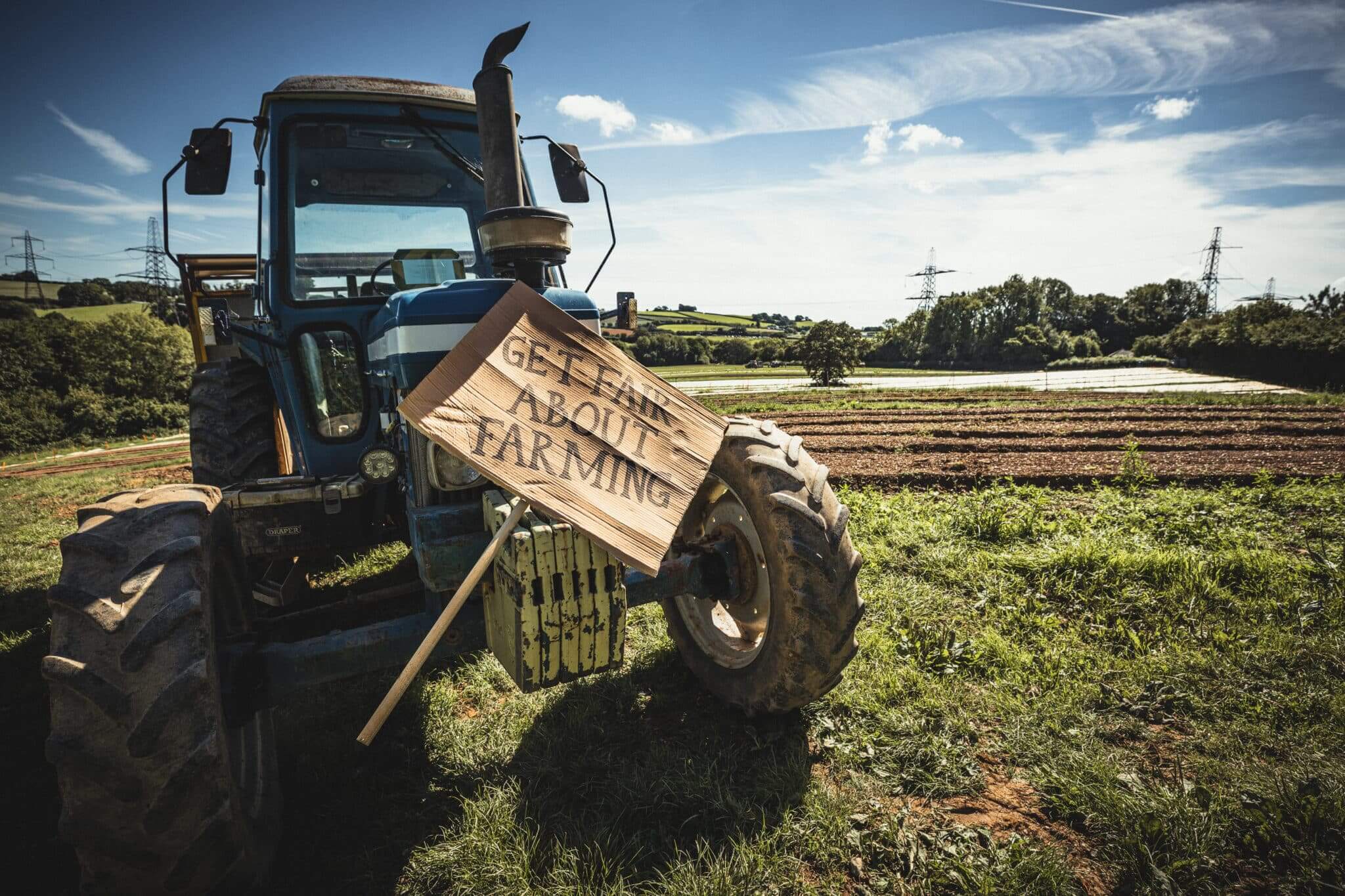Eggs thrown at European parliament, tractors blockading motorways, manure sprayed over supermarkets, bales of straw set alight – these are the actions of tens of thousands of farmers across Europe who are taking to the streets to highlight the untenable position they find themselves in. At the heart of their message is that they are struggling – unfair supermarket buying practices, competition from cheap and unregulated imports, continually rising costs, and restrictions imposed by new environmental standards have left many on the brink of survival.
“These factors have been building for many years with farmers tightening their belts and keeping their heads down, draining their capital and sending their partner out to work, but we have reached a point where the distress is so widespread and so persistent that there is nothing left to squeeze,” says Guy Singh-Watson, founder of Riverford Organic Farmers.
Over the past few months these protests have taken place in Germany, Spain, Poland and Greece, but it’s in the last few weeks when farmers blockaded roads into Paris and tractors took over Brussels that the profile of these actions has hit mainstream media and risen to the top of the political agenda.
Activism and direct action have a strong history within the agricultural community as a key way for farmers to successfully fight to protect their livelihoods and the food system. In 2020, hundreds of thousands of Indian farmers took to the streets to protest against three new laws that threatened the prices they received for their produce. The laws were eventually repealed over a year later.
The present-day protests see farmers on all sides – small-scale and organic alongside larger, commercial and conventional producers – united by their powerlessness in the face of unfair supply chains and supermarket control. The situation has reached breaking point; Politico reported that producers are receiving nine per cent less for their produce in 2023 than in 2022, and in the UK 49 per cent of fruit and veg farmers fear closure in the next 12 months, with three quarters of them stating that supermarket behaviour is a key part of this.
In addition, farmers are facing rising labour, energy, fertiliser and transportation costs. “At Riverford, our labour costs have risen by 33 per cent in four years,” Guy explains. There is also widespread concern about new free-trade deals – namely the proposed Mercosur deal between the EU and Latin America – and the impact that cheaper imported food will have on European farmers, especially given that it won’t be subject to the same stringent European environmental regulations.
While British farmers haven’t yet taken to the capital in their tractors, they are facing the same perfect storm of pressure. “Here in the UK, we share European farmers’ concerns and frustration. Years of unsustainably high production costs and crop losses because of extreme weather are putting farming families under mounting pressure,” NFU President Minette Batters explains. While not all are supportive of direct action, Minette stresses the importance of “the British public [who] have demonstrated invaluable support. In 2020, more than one million people signed the NFU’s petition to safeguard British food and farming standards which led to greater government scrutiny over trade deals, and in 2023 nearly 50,000 signatures led to the Prime Minister hosting a Food Security Summit. We do not take this support or its influence for granted, and it’s why protests should always be a last resort.”
I’ve said it a thousand times, but Farming needs an actual plan. Instead it’s just left to Tesco to do what they’ll always do – push for profit, at any cost. Guy Singh-Watson
Guy Singh-Watson agrees on the power of public support – witnessed first-hand when Riverford’s #GetFairAboutFarming petition rose beyond 110,000 signatures and was debated by MPs in Parliament last month – but takes a different view on the drivers of change. “In most markets this situation would have forced price rises, but most farmers are so committed to what they do that they’ll continue even when losing money – hence why we’re not seeing steady, progressive change as politicians continue to drag their heels. I think the change will come instead with a big bump – empty shelves, deserted marginal land and the demise of rural communities with no skills left to manage the green transition. I’ve said it a thousand times, but Farming needs an actual plan – and while there is one (slowly) emerging for the environment, there’s nothing in place for the desperately needed reformation of our food system… instead it’s just left to Tesco to do what they’ll always do – push for profit, at any cost.”
Within the fields of protesting farmers there is also growing division as increased environmental regulations are introduced. In the EU, farmers are being asked to halve pesticide use by 2030 and leave nine per cent of their land fallow each year; in the Netherlands cow numbers may be reduced due to nitrogen emissions and German farmers face the phase-out of tax breaks on agricultural diesel.
Farmers are being blamed for environmental pollution, while also being unremittingly pressured to increase production – told that more is better regardless of the cost to the environment (not to mention the farmer’s own livelihood and wellbeing).
Farms have grown in size, become more reliant on pesticides and fertilisers, torn up hedgerows and abandoned rotations in order to meet these spiralling demands. And now these same farmers are facing regulations around chemical use and enforced fallow land, without reprieve from the production-focused food system they have been forced into.
Alongside more flagrant right-wing factions, including the open display of ethnic-nationalist symbols on tractors and conspiracy theories about governments trying to starve populations, an undercurrent of anti-immigration, climate-denying and anti-net-zero rhetoric is also present at some protests. A fight that has been caused by unfairness in the supply chain is in danger of being co-opted by those who are lobbying for the slackening of environmental standards.
This shift in focus poses a serious issue for many. “I’m a fan of direct action – heck I have my own pitchforks – but it’s important to ask ourselves two questions. Do we share common ground? And do we share common purpose?” Sue Pritchard, Chief Executive of the Food, Farming and Countryside Commission explains. “I want to see a rapid shift to more sustainable farming, where farmers are rewarded properly for producing more of the healthy food we need, mitigating climate change and restoring nature and landscapes.”
At the heart of Riverford’s #getfairaboutfarming campaign is the need for fair payment and terms from supermarkets, but alongside better relationships with suppliers, there is also a need for a shift to agroecological production that protects both the livelihoods of our farmers and the land for future generations.
“Everyone stands to lose if regulation fails to limit climate change and the degradation of the natural environment, because food production will become impossible due to extreme weather and the loss of ecosystem services,” Rebecca Laughton, Horticulture Campaigns Coordinator for the Landworkers’ Alliance points out. “Farmers of all types need to stand together with all who eat food and call out supermarkets for their role in driving down food prices while making impossible contractual demands on farmers. A different, fairer and more collaborative system is possible, but we need politicians to show some leadership in demanding and creating the conditions in which such a system can thrive.”










Thank you, thank you, thank you Guy! We signed but you did!
Farming is only one aspect of the omni-crisis that we face. Money being at the core of everything is the obvious mistake. If we put carbon emissions at the core, almost everything will follow. Instead of income tax in any form we have carbon tax. Supermarkets that cause crops to be wasted through sharp practice, pay for the associated carbon emissions.
Rich people who want to fly private jets pay the tax. Supermarkets that fly in lettuce pay the tax.
Big house, big heating bill, big tax.
Washing machine repair, tiny carbon footprint (if the repair man drives electric) tiny tax. Washing machine replacement, big footprint, more tax.
I am not saying it is an easy proposition. The rich and powerful would do anything to stop it. The average population would have very little to lose and everything to save.